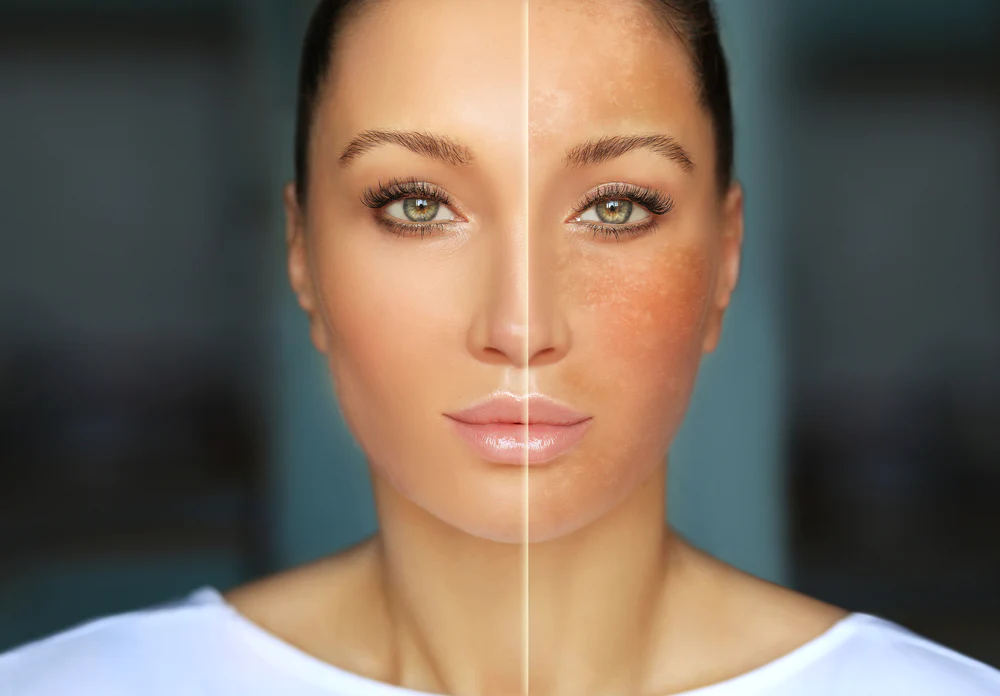Uneven skin tone, also known as hyperpigmentation, occurs when certain areas of the skin produce more melanin, the pigment responsible for giving our skin its color. An even glowing complexion is indeed highly desired, as it is often associated with youthfulness and beauty. However, achieving such a complexion can be challenging for many individuals due to the presence of uneven skin tone, scientifically known as hyperpigmentation. Hyperpigmentation is a common skin concern that occurs when certain areas of the skin produce more melanin, the pigment responsible for skin, hair, and eye color. Excessive melanin production leads to the appearance of dark spots or patches on the skin, disrupting the uniformity of the skin tone. Here we will discuss the causes and treatment of uneven skin tone.
Causes of Uneven Skin Tone:
Sun Exposure:
Excessive exposure to the sun’s ultraviolet (UV) rays is one of the most common causes of hyperpigmentation. When the skin is exposed to UV radiation, melanocytes produce more melanin as a natural defense mechanism to protect the skin from further damage. This increase in melanin production results in the formation of dark spots or sunspots, especially on areas frequently exposed to the sun, such as the face, neck, shoulders, and hands.
Hormonal Changes:
Hormonal changes play a significant role in the development of uneven skin tone or hyperpigmentation. During certain life stages, such as pregnancy, hormonal fluctuations can trigger a skin condition called melasma, often referred to as the “mask of pregnancy.” Melasma leads to the appearance of dark patches on the face due to increased melanin production in response to hormonal shifts. Additionally, the use of birth control pills or hormone replacement therapy can also influence hormone levels, potentially causing hormonal pigmentation in some women. Managing hormonal changes through appropriate medical guidance and adopting skincare practices that protect the skin from further pigmentation issues can help minimize the impact of hormonal fluctuations on the skin’s appearance, promoting a more balanced and radiant complexion.
Post-Inflammatory Hyperpigmentation (PIH):
Skin inflammation caused by acne breakouts, cuts, burns, or other injuries can lead to post-inflammatory hyperpigmentation (PIH). When the skin undergoes inflammation, it triggers an increase in melanin production during the healing process. As a result, dark marks or patches remain even after the initial injury or inflammation has healed.
Age and Genetics:
The natural aging process can also contribute to uneven skin tone. Over time, accumulated sun exposure and other environmental factors can lead to the development of age spots, also known as liver spots or solar lentigines. These spots typically appear in older individuals and are more common in areas exposed to the sun. Additionally, genetics play a role in an individual’s susceptibility to hyperpigmentation. People with naturally darker skin tones tend to have more active melanocytes and are generally more prone to certain forms of hyperpigmentation.
Skin Conditions and Trauma:
Skin conditions and trauma can be significant factors contributing to uneven skin tone or hyperpigmentation. Skin conditions such as eczema, psoriasis, and other chronic dermatological disorders often involve inflammation, which triggers an increased production of melanin. This excessive melanin production can result in dark spots or patches on the affected skin areas, leading to post-inflammatory hyperpigmentation. Additionally, injuries, burns, or trauma to the skin can also lead to a similar response, as the skin undergoes a healing process that may involve heightened melanin production, causing lasting dark marks. Proper management and treatment of skin conditions and timely care for skin injuries are vital in preventing and addressing hyperpigmentation and promoting a more even and healthy skin tone.
Hormonal Disorders:
Hormonal disorders can impact the skin’s pigmentation, leading to uneven skin tone or hyperpigmentation. Conditions such as Cushing’s syndrome and Addison’s disease can disrupt the body’s hormonal balance, leading to increased melanin production in certain areas of the skin. This excess melanin can cause dark spots or patches to appear on the skin, contributing to the development of hyperpigmentation. Addressing the underlying hormonal imbalance through medical management and treating the resulting skin pigmentation concerns can be crucial in achieving a more balanced and uniform complexion. Seeking professional advice and treatment for hormonal disorders can help minimize their impact on the skin’s pigmentation and overall health.
Allergic Reactions and Irritation:
Allergic reactions and irritation can lead to hyperpigmentation or uneven skin tone. When the skin comes into contact with allergens or irritants, it may trigger an inflammatory response. This inflammation can stimulate the production of melanin, causing dark spots or patches on the affected area. Allergic reactions to certain skincare products, cosmetics, or environmental allergens, as well as skin irritation from harsh ingredients or treatments, can contribute to the development of post-inflammatory hyperpigmentation. Managing allergies and avoiding irritating substances are essential steps in preventing hyperpigmentation and maintaining a more even complexion.
Skincare Tips for Improving Uneven Skin Tone:
Addressing uneven skin tone requires a comprehensive and consistent skincare routine. Improving uneven skin tone requires a comprehensive skincare routine that addresses the underlying causes of hyperpigmentation and promotes a more even complexion. Here are detailed skincare tips to help you achieve a smoother and balanced skin tone:
Sun Protection:
Sunscreen is your best defense against hyperpigmentation. Regularly apply a broad-spectrum sunscreen with an SPF of 30 or higher to protect your skin from harmful UV rays. Sunscreen helps prevent further darkening of existing spots and reduces the risk of new hyperpigmentation. Reapply sunscreen every two hours, especially if you are outdoors or in direct sunlight.
Gentle Cleansing:
Choose a mild, non-abrasive cleanser that suits your skin type and use it twice daily. Gentle cleansing helps remove dirt, oil, and impurities without causing irritation or aggravating existing hyperpigmentation. Avoid using harsh scrubs or abrasive cleansing brushes, as they can lead to inflammation and worsen uneven skin tone.
Exfoliation:
Incorporate exfoliation into your skincare routine to promote skin cell turnover and remove dead skin cells. Chemical exfoliants with alpha hydroxy acids (AHAs) or beta hydroxy acids (BHAs) are effective for exfoliating the skin gently. Exfoliation helps fade dark spots and reveals a brighter, more even complexion. However, don’t over-exfoliate, as it can cause irritation and sensitivity.
Brightening Ingredients:
Look for skincare products containing brightening ingredients that can help fade dark spots and promote a more even skin tone. Vitamin C is a potent antioxidant that inhibits melanin production, while niacinamide and licorice root extract have brightening properties. Kojic acid is also effective in reducing hyperpigmentation. Incorporate products with these ingredients into your routine to address uneven skin tone.
Hydration:
Keep your skin well-hydrated by using a lightweight, oil-free moisturizer suitable for your skin type. Proper hydration helps maintain the skin’s barrier function and reduces the risk of inflammation, which can exacerbate hyperpigmentation. Hydrated skin appears plumper and healthier, contributing to a more even complexion.
Nighttime Treatments:
Consider using targeted treatments at night to address hyperpigmentation. Retinoids, derived from vitamin A, are known for their skin-renewing properties and can help fade dark spots over time. However, start with a low concentration and gradually increase to avoid irritation.
Avoid Irritants:
Be mindful of skincare products or cosmetic ingredients that may cause irritation or allergic reactions. Irritation can trigger post-inflammatory hyperpigmentation, exacerbating uneven skin tone. Patch test new products before applying them to your face and discontinue use if any adverse reactions occur.
Professional Treatments for Uneven Skin Tone:
Professional treatments for uneven skin tone are performed by trained dermatologists for skin care specialists and can significantly improve the appearance of hyperpigmentation. These treatments target the underlying causes of uneven skin tone and are more potent and effective than over-the-counter skin care products. Here are some of the most common professional treatments for uneven skin tone:
Laser Therapy:
Laser treatments, such as Intense Pulsed Light (IPL) and fractional lasers, are highly effective in targeting and breaking down excess pigment in the skin. IPL uses broad-spectrum light to target melanin, while fractional lasers create controlled micro-injuries to trigger the skin’s natural healing process. As the skin heals, dark spots fade, and a more even skin tone is revealed. Multiple sessions may be required for optimal results, and the downtime is usually minimal.
Chemical Peels:
Chemical peels involve applying a chemical solution to the skin, causing controlled exfoliation and peeling of the outermost layer. This process helps to remove surface pigmentation, improve skin texture, and stimulate collagen production. Chemical peels are available in various strengths, and the type of peel used will depend on the severity of hyperpigmentation. Recovery time and results may vary depending on the depth of the peel.
Microdermabrasion:
Microdermabrasion is a non-invasive procedure that uses tiny exfoliating crystals to gently remove the outer layer of the skin. This exfoliation process helps reduce the appearance of dark spots, improve skin texture, and stimulate collagen production. Microdermabrasion is considered a milder treatment compared to lasers or chemical peels, and it requires minimal downtime.
Prescription Topicals:
A dermatologist may prescribe topical treatments containing potent ingredients such as retinoids, hydroquinone, or corticosteroids for more stubborn cases of hyperpigmentation. Retinoids, derived from vitamin A, promote skin cell turnover and can help fade dark spots over time. Hydroquinone is a skin-lightening agent that inhibits melanin production, and corticosteroids reduce inflammation and post-inflammatory hyperpigmentation. These prescription topicals are generally used under medical supervision and require careful application.
Combination Therapies:
In some cases, a combination of treatments may be recommended to achieve the best results. For instance, a dermatologist may suggest using topical treatments in combination with laser therapy or chemical peels to address different layers of hyperpigmentation effectively.
Consultation and Customization:
Before undergoing any professional treatment, it’s essential to schedule a consultation with a qualified dermatologist. They will assess your skin condition, determine the type and severity of hyperpigmentation, and recommend the most suitable treatment plan tailored to your individual needs.
Conclusion
Uneven skin tone, or hyperpigmentation, can be a common and frustrating skin concern for many individuals. Understanding the underlying causes and implementing effective skincare tips can significantly contribute to the gradual improvement of your complexion. Prioritizing sun protection, maintaining a consistent skincare routine, and considering professional treatments when necessary are vital steps towards achieving a smoother, more radiant, and even skin tone. It is essential to remember that everyone’s skin is unique, so patience and persistence are key. For personalized advice and the most suitable treatment options, consult with a dermatologist who can provide tailored solutions to meet your specific needs and goals. Embrace your journey to healthier, more balanced skin, and let your natural beauty shine through with confidence.
Ready to take care of your skin with skin care products suggested by dermatology and serum for every skin type? Look no further than Skin Care Services available in Akarshan Skin Clinic. Our team of experienced dermatologists, surgeons and staff provides treatment of skin hair transplantation with excellence and care. Don’t miss out on the opportunity to take care of your skin. Here in Akarshan you can get an experienced dermatologist so you can book an appointment today and experience the transformation on your skin. Simply click the link below or give us a call at [+01 4621966, +977 9813994443] to schedule your appointment. Take control of your skin care with an experienced dermatologist now!



Leave A Comment